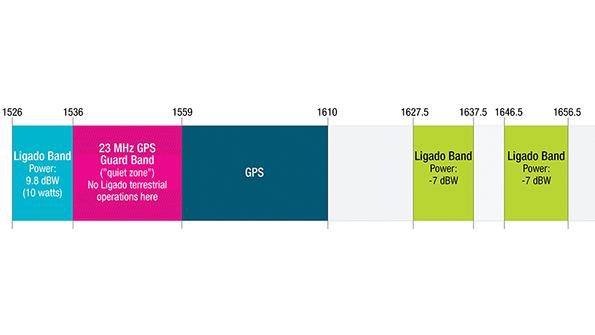
Commercial aviation groups and manufacturers planned to file seven petitions challenging the Federal Communications Commission’s (FCC) recent decision to grant Ligado Networks access to radio frequency spectrum near bands used for critical aviation applications.
The Air Line Pilots Association (ALPA), Aviation Spectrum Resources, Iridium Communications, GPS satellite manufacturer Lockheed Martin, the Association of Equipment Manufacturers, Trimble and the Resilient Navigation and Timing Foundation were lead sponsors of the petitions, their media relations firm announced on May 21.
Included among the petitioners are Airlines for America, the Cargo Airline Association and IATA, according to the announcement.
“The petitioners argue the FCC’s order ignored or improperly disregarded the great majority of evidence, including technical analyses submitted by parties, showing harmful interference and relied instead on easily disproven claims that Ligado will provide a so-called 5G service,” the release states.
ALPA, representing pilots at 34 U.S. and Canadian airlines, announced separately on May 20 that it had petitioned the FCC to reverse its “hasty, arbitrary and incorrect decision” to grant Ligado access to radio frequency spectrum near the L-band frequencies used for GPS and satellite communications (satcom).
Presaging legislative action, a bipartisan group of 32 U.S. senators sent a letter to the commission on May 15, urging it to stay and reconsider the licensing decision.
“ALPA is seriously concerned that the commission did not fully comprehend or appreciate the safety performance levels required to ensure safe operation of GPS aviation communication, navigation and surveillance services,” the pilots’ union states in its petition.
“The tests and evidence relied upon by the commission were inadequate to rule out failure modes that can result in serious adverse safety consequences from interference with critical GPS-dependent aviation equipment and services,” ALPA adds.
On April 20, the FCC announced that it had approved license modifications enabling Ligado to deploy a low-power, ground-based 5G cellular network using L-band spectrum between 1 and 2 GHz. The commission adopted the order on April 19—a Sunday—and issued it on April 22.
The order allows Reston, Virginia-based Ligado to use the 1526-1536 MHz, 1627.5-1637.5 MHz and 1646.5-1656.5 MHz bands for its terrestrial network. It requires the company to provide a 23 MHz “guard band” adjacent to the GPS band at 1559-1610 MHz, and to limit the power of its base stations to protect against interfering with GPS signals from satellites.
The ALPA petition asks the FCC to disallow Ligado from operating transmitters adjacent to the GPS band and in spectrum allocated for mobile satellite services (MSS) at 1.6 GHz. “[T]he risk of harm to aviation and other satellite spectrum users far outweighs any public benefit,” the pilots’ union argues. “The public benefit from repurposing this spectrum for non-satellite 5G use is minimal.”
FAA-certified avionics are hardened against potential interference by a Ligado ground transmitter operating at a distance. ALPA’s concern is that general aviation pilots using tablet devices with uncertified GPS receivers to help them navigate—as well as small drones using uncertified receivers—are much more susceptible to interference, potentially causing them to blunder into the path of airliners.
ALPA also raises the potential of Ligado-enabled smartphones carried by airline passengers interfering with L-band satellite communications (satcom) used for controller-pilot data link communications and automatic dependent surveillance-contract position reports—applications used by air navigation service providers to track and separate aircraft over remote and oceanic areas outside of radar coverage.
“If Ligado-compatible handsets were carried onboard aircraft by passengers and were to become active when satcom is being used for communications and surveillance, these safety services could potentially be disrupted,” the petition argues.
“At a minimum, resolving this interference would likely result in the need for safety regulators around the world to mandate the wholesale of replacement of satcom equipment on aircraft without any plan for who will pay,” ALPA adds.
London-based Inmarsat and Iridium Communications, based in McLean, Virginia, provide L-band satellite connectivity for critical aviation applications. In its 74-page order, the FCC states that Ligado has entered into an arrangement with Inmarsat to address potential interference concerns, but not with Iridium.
“Ligado also has endeavored to address potential interference concerns Iridium has raised related to Iridium’s adjacent MSS operations, but the two parties have not reached an understanding,” the FCC order states. “Absent an understanding between the parties, we reduce Ligado’s emissions within the frequency band used by Iridium and encourage the parties to engage in further discussions to reach mutually satisfactory arrangements where possible.”





